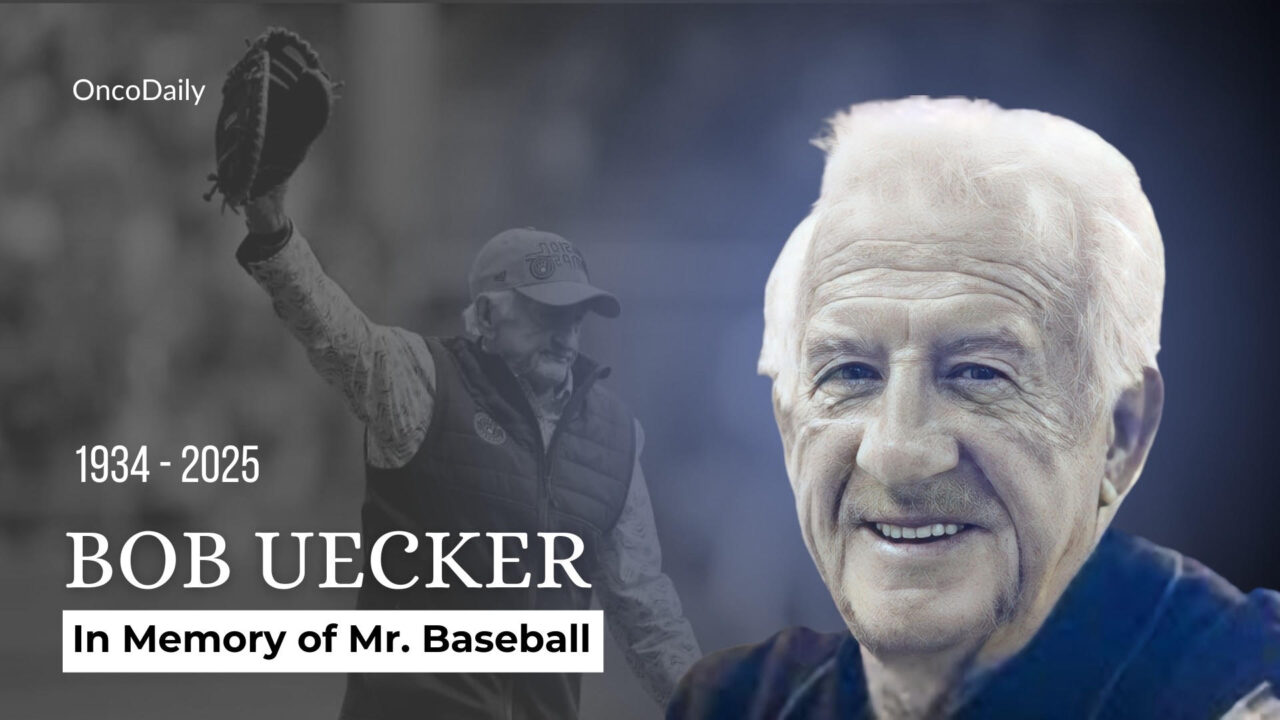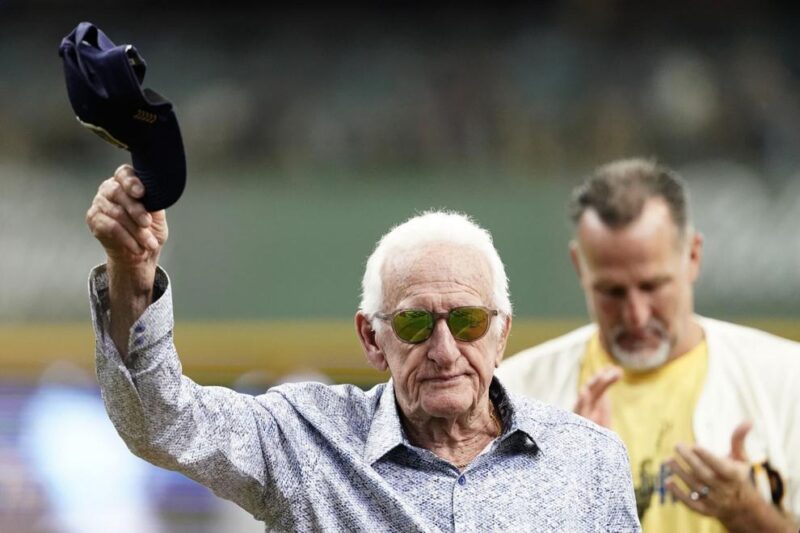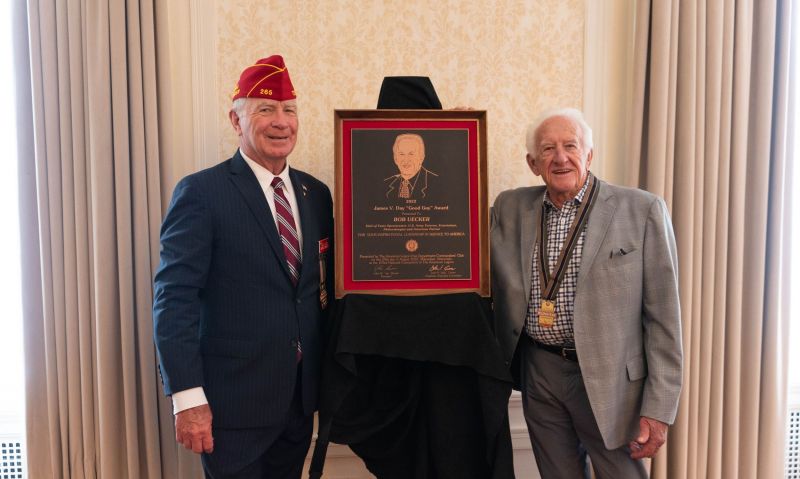
Bob Uecker Dies at 90 from Small-Cell Lung Cancer
Bob Uecker, born on January 26, 1935, in Milwaukee, Wisconsin, is a well-known figure in the world of baseball and entertainment. He is often referred to as “Mr. Baseball” due to his extensive career in Major League Baseball (MLB) as a player and broadcaster. Bob Uecker passed away on January 16, 2025, at the age of 90. He is remembered for his engaging personality and deep connection with fans, leaving behind a significant legacy in the world of baseball.

ILE – Milwaukee Brewers radio announcer Bob Uecker tips his cap before a baseball game between the Milwaukee Brewers and the Miami Marlins, July 28, 2024, in Milwaukee. (AP Photo/Aaron Gash)
Uecker’s final year was marked by a private and courageous battle with small-cell lung cancer, which he had been fighting since early 2023. His family shared that despite the severity of his condition, he faced this challenge with remarkable strength and resilience. Even as the disease progressed, Uecker’s love for life never wavered.
Bob Uecker’s Legendary Baseball Career
Bob Uecker, a name synonymous with baseball, made his MLB debut on April 13, 1962, with the Milwaukee Braves. Known for his resilience and dedication to the game, Uecker played as a catcher for the Milwaukee Braves, St. Louis Cardinals, and Philadelphia Phillies from 1962 to 1967. His most significant achievement as a player came in 1964, when he was part of the St. Louis Cardinals team that triumphed in the World Series, contributing as a backup catcher to one of the most iconic moments in baseball history.
Though his playing career spanned only six seasons, Uecker’s impact on the field was undeniable. He amassed a career batting average of .200, with 14 home runs and 74 RBIs in 297 games. Uecker was renowned for his exceptional defensive skills behind the plate, boasting a fielding percentage of .981, a testament to his reliability and sharp instincts as a catcher.
The Voice That Never Left Baseball
Bob Uecker’s broadcasting career spanned an incredible 54 years, making him one of the longest-serving and most beloved voices in Major League Baseball history. Starting in 1971, Uecker joined the Milwaukee Brewers’ broadcast team, a role he held until his passing in 2025. His deep connection with fans and distinctive voice made him an integral part of Brewers baseball for generations.
Uecker’s trademark catchphrase,
“Get up! Get outta here! Gone!”
became synonymous with Brewers home runs, endearing him to fans and making his calls unforgettable. He was the voice behind some of the most memorable moments in Brewers history, including Hank Aaron’s 755th home run on July 20, 1976, the Brewers’ 1982 American League pennant-clinching game, Juan Nieves’ no-hitter on April 15, 1987, and Robin Yount’s 3,000th hit on September 9, 1992.

American Legion National Commander Paul Dillard presents the 2022 James V. Day “Good Guy” Award to Hall of Famer Bob Uecker
during the American Legion’s 103rd National Convention in Milwaukee on Monday, Aug. 29. Photo by Hilary Ott/The American Legion
His remarkable ability to capture the excitement of the game, paired with his humor and passion, set him apart as a broadcaster. In 2003, Uecker’s unparalleled contributions to baseball broadcasting earned him the prestigious Ford C. Frick Award from the Baseball Hall of Fame.
Key Statistics and Insights of Small Cell Lung Cancer
Small cell lung cancer (SCLC) accounts for 10-15% of all lung cancer cases, with 90% of patients being smokers or former smokers (American Cancer Society, 2020). It arises from neuroendocrine cells in the lung and is known for its aggressive behavior and early metastasis. SCLC is typically diagnosed at an advanced stage, with 70-80% of patients presenting with extensive-stage disease, which has a 5-year survival rate of about 6% (Pinder & Spiro, 2022).
Clinical symptoms include cough, chest pain, weight loss, and dyspnea, often accompanied by paraneoplastic syndromes like SIADH (National Cancer Institute, 2020). Diagnosis is confirmed via imaging and biopsy, with histological analysis revealing small, densely packed cells. Treatment involves chemotherapy, commonly with cisplatin or carboplatin and etoposide, and radiation therapy for limited-stage disease. Recent advances in immunotherapy, including PD-1 inhibitors, have shown promising results, particularly in extensive-stage SCLC (Baudouin & Besse, 2021).
Despite initial responses to treatment, relapse is common due to the high rate of chemotherapy resistance, making SCLC one of the most difficult cancers to treat. Continued research into targeted therapies and early detection is crucial for improving outcomes (Herbst & Soria, 2021).
How Can Small Cell Lung Cancer Be Prevented?
Small cell lung cancer (SCLC) is a highly aggressive form of lung cancer, and while there are no guaranteed methods to completely prevent it, there are several evidence-based strategies to reduce the risk of developing the disease.
Small cell lung cancer (SCLC) is strongly linked to environmental and lifestyle factors, with smoking being the most significant risk factor. Approximately 85% of SCLC cases are attributed to tobacco use (Siegel et al., 2020), making smoking cessation the most effective preventive measure. Quitting smoking, or never starting, greatly reduces the risk of lung cancer over time, with former smokers experiencing a significantly lower risk compared to current smokers (Jemal et al., 2018).In addition to smoking, exposure to secondhand smoke has been identified as a risk factor for SCLC. The World Health Organization (WHO) classifies secondhand smoke as a Group 1 carcinogen (WHO, 2014). Avoiding environments where smoking is prevalent is essential to reducing the risk of lung cancer.
Radon exposure is the second leading cause of lung cancer in the United States (CDC, 2020). Radon is a naturally occurring radioactive gas that can accumulate in homes and workplaces, posing a significant risk. It is recommended that homes and workplaces be tested for radon, with mitigation strategies implemented in areas with high radon levels.Long-term exposure to air pollution, particularly particulate matter and environmental toxins, also increases the risk of developing lung cancer. Reducing exposure to polluted air by avoiding outdoor activities during high pollution days or relocating to areas with lower pollution can help mitigate this risk.
For individuals at high risk, such as those with a history of heavy smoking, early detection through low-dose computed tomography (LDCT) screening is recommended. LDCT screening has been shown to detect lung cancer early, potentially reducing mortality by enabling early intervention (National Lung Screening Trial Research Team, 2011).Although smoking remains the leading cause of SCLC, genetic factors may also contribute to an individual’s susceptibility. People with a family history of lung cancer might consider genetic counseling to assess their risk and explore preventive strategies, though genetic screening for SCLC is still an emerging area of research.
By adopting preventive measures such as smoking cessation, avoiding secondhand smoke, reducing exposure to radon and air pollution, and considering early detection, individuals can significantly lower their risk of developing small cell lung cancer. Continued research into these strategies will further enhance our understanding of how to prevent this aggressive disease.
Oncodaily’s Condolences on the Passing of Bob Uecker
On behalf of everyone at Oncodaily, we extend our deepest condolences to the family, friends, and fans of Bob Uecker. His passing marks the end of an era in baseball and broadcasting. Bob’s remarkable contributions to the sport, his enduring presence as a broadcaster, and the joy he brought to countless listeners will forever remain in the hearts of all who followed his career.
We recognize the strength and resilience he showed throughout his life, both on and off the field, and his ability to connect with fans and the broader community. He will be greatly missed, but his legacy will live on through the memories of his unforgettable moments in the world of baseball.Our thoughts are with his loved ones during this difficult time. May his legacy continue to inspire, and may his family find strength in the outpouring of love and support from around the world.
You can also watch EGFR-Mutant Lung Cancer: Targeted Therapy & Resistance Strategies by OncoDaily
-
ESMO 2024 Congress
September 13-17, 2024
-
ASCO Annual Meeting
May 30 - June 4, 2024
-
Yvonne Award 2024
May 31, 2024
-
OncoThon 2024, Online
Feb. 15, 2024
-
Global Summit on War & Cancer 2023, Online
Dec. 14-16, 2023
